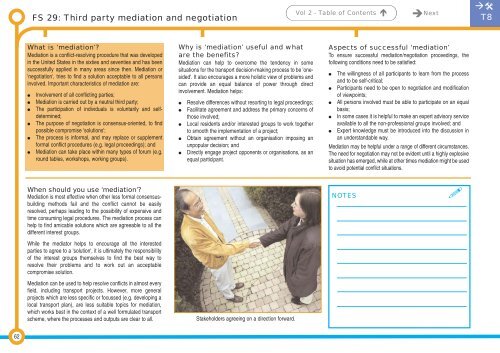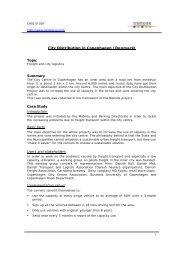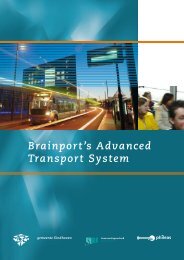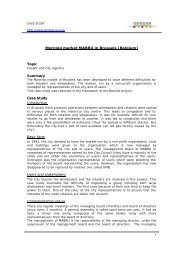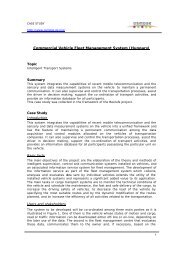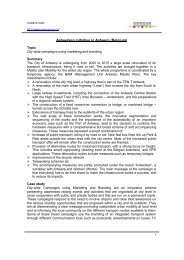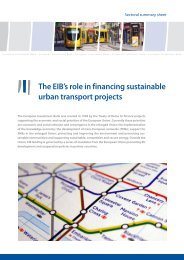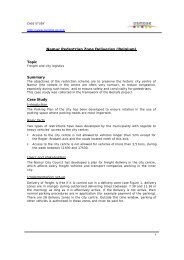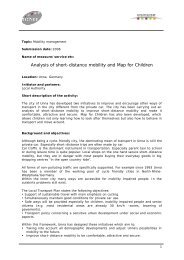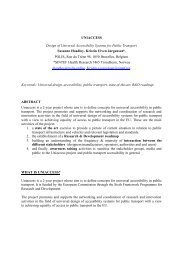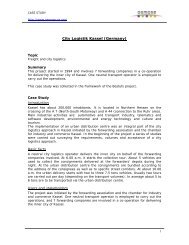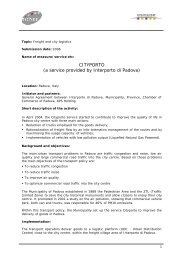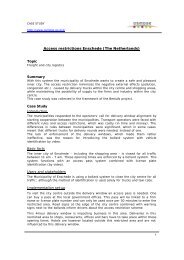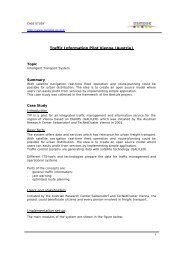Successful transport decision-making - Osmose
Successful transport decision-making - Osmose
Successful transport decision-making - Osmose
Create successful ePaper yourself
Turn your PDF publications into a flip-book with our unique Google optimized e-Paper software.
FS 29: Third party mediation and negotiation<br />
Vol 2 - Table of Contents <br />
Next<br />
<br />
T8<br />
What is ‘mediation’?<br />
Mediation is a conflict-resolving procedure that was developed<br />
in the United States in the sixties and seventies and has been<br />
successfully applied in many areas since then. Mediation or<br />
'negotiation', tries to find a solution acceptable to all persons<br />
involved. Important characteristics of mediation are:<br />
<br />
<br />
<br />
<br />
<br />
<br />
Involvement of all conflicting parties;<br />
Mediation is carried out by a neutral third party;<br />
The participation of individuals is voluntarily and selfdetermined;<br />
The purpose of negotiation is consensus-oriented, to find<br />
possible compromise 'solutions';<br />
The process is informal, and may replace or supplement<br />
formal conflict procedures (e.g. legal proceedings); and<br />
Mediation can take place within many types of forum (e.g.<br />
round tables, workshops, working groups).<br />
Why is ‘mediation’ useful and what<br />
are the benefits?<br />
Mediation can help to overcome the tendency in some<br />
situations for the <strong>transport</strong> <strong>decision</strong>-<strong>making</strong> process to be 'onesided'.<br />
It also encourages a more holistic view of problems and<br />
can provide an equal balance of power through direct<br />
involvement. Mediation helps:<br />
<br />
<br />
<br />
<br />
<br />
Resolve differences without resorting to legal proceedings;<br />
Facilitate agreement and address the primary concerns of<br />
those involved;<br />
Local residents and/or interested groups to work together<br />
to smooth the implementation of a project;<br />
Obtain agreement without an organisation imposing an<br />
unpopular <strong>decision</strong>; and<br />
Directly engage project opponents or organisations, as an<br />
equal participant.<br />
Aspects of successful ‘mediation’<br />
To ensure successful mediation/negotiation proceedings, the<br />
following conditions need to be satisfied:<br />
The willingness of all participants to learn from the process<br />
and to be self-critical;<br />
Participants need to be open to negotiation and modification<br />
of viewpoints;<br />
All persons involved must be able to participate on an equal<br />
basis;<br />
In some cases it is helpful to make an expert advisory service<br />
available to all the non-professional groups involved; and<br />
Expert knowledge must be introduced into the discussion in<br />
an understandable way.<br />
Mediation may be helpful under a range of different circumstances.<br />
The need for negotiation may not be evident until a highly explosive<br />
situation has emerged, while at other times mediation might be used<br />
to avoid potential conflict situations.<br />
When should you use ‘mediation’?<br />
Mediation is most effective when other less formal consensusbuilding<br />
methods fail and the conflict cannot be easily<br />
resolved, perhaps leading to the possibility of expensive and<br />
time consuming legal procedures. The mediation process can<br />
help to find amicable solutions which are agreeable to all the<br />
different interest groups.<br />
While the mediator helps to encourage all the interested<br />
parties to agree to a 'solution', it is ultimately the responsibility<br />
of the interest groups themselves to find the best way to<br />
resolve their problems and to work out an acceptable<br />
compromise solution.<br />
NOTES<br />
<br />
Mediation can be used to help resolve conflicts in almost every<br />
field, including <strong>transport</strong> projects. However, more general<br />
projects which are less specific or focussed (e.g. developing a<br />
local <strong>transport</strong> plan), are less suitable topics for mediation,<br />
which works best in the context of a well formulated <strong>transport</strong><br />
scheme, where the processes and outputs are clear to all.<br />
Stakeholders agreeing on a direction forward.<br />
62


